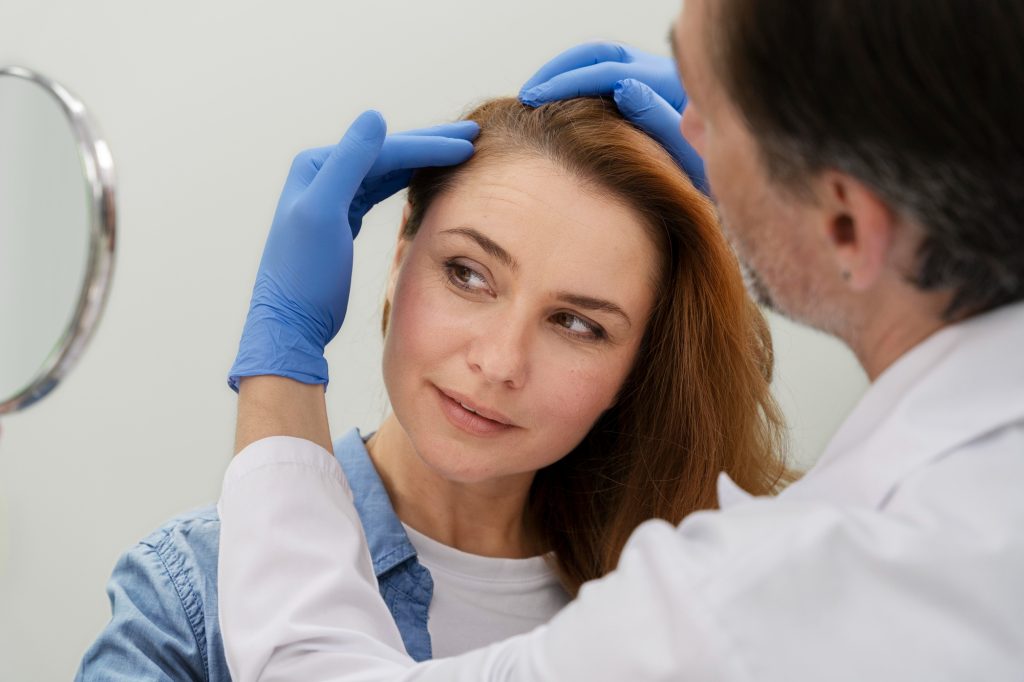Discover the potential connection between stress and hair loss in this informative article.
Can Stress Cause Hair Loss? Exploring the Link

Stress is something we all experience from time to time. It can be triggered by a variety of factors, such as work pressure, relationship problems, or even just trying to juggle all of life’s demands. But have you ever wondered if stress can actually cause hair loss? In this article, we will explore the link between stress and hair loss, and discover the truth behind this common belief.
Understanding Hair Loss
Before we dive into the connection between stress and hair loss, it’s important to understand how hair growth works. Your hair goes through a series of growth cycles, which include a growth phase, a resting phase, and a shedding phase. This cycle repeats itself continuously throughout your life.
During the growth phase, your hair follicles produce new hair cells, nourished by blood vessels in the scalp. This is the active phase where your hair grows longer and thicker. The rate at which your hair grows during this phase can vary depending on factors such as genetics, age, and overall health.
Next comes the resting phase, also known as the telogen phase. During this phase, the hair follicles take a break from producing new cells. This phase can last for several weeks to several months. It’s important to note that not all hair follicles are in the resting phase at the same time. In fact, only about 10-15% of your hair follicles are typically in the resting phase at any given time.
Finally, the shedding phase, or the exogen phase, occurs. This is when the old hair falls out to make room for new hair to grow. On average, we lose about 50-100 hairs per day during this phase. It’s important to remember that hair loss is a natural part of this cycle.
The Hair Growth Cycle
Understanding the hair growth cycle is crucial in comprehending the complex relationship between stress and hair loss. Stress can disrupt this cycle, leading to various hair loss conditions. When you experience stress, your body releases hormones such as cortisol, which can have a negative impact on your hair follicles.
Excessive stress can push your hair follicles into the resting phase prematurely, causing a condition known as telogen effluvium. This condition leads to increased shedding of hair, resulting in noticeable hair thinning or even bald patches. Telogen effluvium is usually temporary, and hair growth resumes once the underlying stress is addressed.
Common Types of Hair Loss
While hair loss is a common concern for many individuals, it’s essential to differentiate between the various types of hair loss to understand their causes and characteristics.
Pattern baldness, also known as androgenetic alopecia, is the most common type of hair loss. It is typically hereditary and affects both men and women. In men, pattern baldness often presents as a receding hairline and thinning at the crown. In women, it usually leads to overall hair thinning.
Alopecia areata is an autoimmune condition that causes patchy hair loss. It occurs when the immune system mistakenly attacks the hair follicles, resulting in hair loss in small, round patches. This condition can be unpredictable, with hair regrowth possible in some cases.
Telogen effluvium, as mentioned earlier, is a type of hair loss that occurs due to a disruption in the hair growth cycle. It can be triggered by various factors, including stress, hormonal changes, nutritional deficiencies, and certain medications. The good news is that telogen effluvium is usually reversible once the underlying cause is addressed.
Understanding the different types of hair loss and their causes is crucial in determining the most appropriate treatment and management options. If you’re experiencing hair loss, it’s always recommended to consult with a healthcare professional or a dermatologist who can provide personalized advice based on your specific situation.
The Role of Stress in the Body
Stress is not just a mental state; it also has a profound impact on your physical health. When you experience stress, your body releases a hormone called cortisol, also known as the “stress hormone.” This hormone is responsible for the fight-or-flight response, which can be useful in certain situations. However, when stress becomes chronic, it can lead to a variety of health problems.
Chronic stress can weaken your immune system, disrupt your sleep patterns, and even increase your risk of developing heart disease. These negative effects on your overall health can also impact the health of your hair.
How Stress Affects Your Health
Stress not only affects your mental well-being but also has a significant impact on your physical health. When you are under stress, your body goes into a state of heightened alertness, preparing itself to either fight or flee from a perceived threat. This response triggers the release of cortisol, a hormone that helps mobilize energy and increase focus and awareness.
While the fight-or-flight response can be beneficial in certain situations, chronic stress can wreak havoc on your body. Prolonged exposure to high levels of cortisol can weaken your immune system, making you more susceptible to infections and diseases. It can also disrupt your sleep patterns, leading to insomnia or poor-quality sleep. Additionally, chronic stress can contribute to the development of heart disease by increasing blood pressure and cholesterol levels.
But the impact of stress doesn’t stop there. It can also take a toll on the health of your hair.
Stress and Hormonal Changes
One of the ways that stress can affect your hair is by causing hormonal changes in your body. When you’re stressed, your body produces more cortisol, which can disrupt the delicate balance of hormones that regulate the hair growth cycle.
Normally, hair follicles go through a cycle of growth, rest, and shedding. However, when cortisol levels are elevated due to chronic stress, the hair growth cycle can be thrown off balance. The increased cortisol can cause hair follicles to enter the resting phase prematurely, leading to hair loss.
Furthermore, stress can also impact the production of other hormones that play a role in hair health. For example, stress can interfere with the production of estrogen and progesterone, hormones that help promote hair growth and thickness. As a result, hair may become thinner, weaker, and more prone to breakage.
It’s important to note that the effects of stress on hair health can vary from person to person. Some individuals may be more genetically predisposed to experiencing hair loss or thinning due to stress, while others may be more resilient. Additionally, the duration and intensity of stress can also influence its impact on hair.
To mitigate the effects of stress on your hair, it’s crucial to find healthy coping mechanisms to manage stress levels. Engaging in regular exercise, practicing relaxation techniques such as meditation or deep breathing, and seeking support from loved ones or professionals can all contribute to reducing stress and promoting overall well-being, including the health of your hair.
Stress and Hair Loss: The Connection
Now that we understand how stress can impact your body and hormones, let’s explore the science behind stress-induced hair loss. While the exact mechanism is not fully understood, studies have shown a clear correlation between stress and hair loss.
Stress is a normal part of life and can manifest in various ways, such as work pressure, relationship issues, financial concerns, or major life events. When we experience stress, our bodies release stress hormones like cortisol, which can have wide-ranging effects on our physical and mental well-being.
The Science Behind Stress-Induced Hair Loss
Researchers believe that chronic stress can trigger an inflammatory response in the body, which can disrupt the hair growth cycle. This inflammation can lead to a condition known as telogen effluvium, where a large number of hair follicles enter the resting phase simultaneously, resulting in increased hair shedding.
During the resting phase of the hair growth cycle, known as the telogen phase, the hair follicles are not actively producing new hair strands. Instead, they remain in a dormant state until they re-enter the anagen phase, where new hair growth begins. However, when stress disrupts this cycle, more hair follicles than usual enter the telogen phase, leading to noticeable hair loss.
Temporary vs. Permanent Hair Loss from Stress
The good news is that stress-related hair loss is usually temporary. In most cases, once the underlying cause of stress is addressed and managed, the hair growth cycle will return to normal, and the hair will gradually grow back.
It’s important to note that not all hair loss is temporary, and some individuals may experience permanent hair loss due to stress. This is more commonly seen in cases of severe or prolonged stress, where the hair follicles may be permanently damaged. However, such cases are relatively rare, and most people will see their hair regrow once the stress is alleviated.
Managing stress is crucial for overall health and well-being, and it can also help prevent or reduce the impact of stress-induced hair loss. Engaging in stress-reducing activities like exercise, meditation, or hobbies can be beneficial in managing stress levels and promoting hair growth.
In conclusion, while stress and hair loss are interconnected, it is essential to address and manage stress effectively to minimize its impact on our bodies, including our hair. By understanding the science behind stress-induced hair loss and adopting healthy stress management techniques, we can promote hair growth and maintain healthy locks.
Preventing and Treating Stress-Related Hair Loss
While stress-related hair loss is often temporary, there are steps you can take to prevent and treat it.
Stress Management Techniques
Managing stress is crucial to maintaining a healthy body and hair. Incorporating stress management techniques, such as exercise, meditation, and deep breathing exercises, can help reduce stress levels and promote hair health.
Medical Treatments and Therapies
If you’re experiencing severe hair loss or your hair is not growing back, it may be time to seek professional help. A dermatologist or trichologist can offer medical treatments, such as topical medications or hair transplant surgeries, to help restore hair growth and manage stress-related hair loss.
When to Seek Professional Help
It’s important to recognize when your hair loss may be a sign of a more serious condition. If you’re experiencing severe hair loss, bald patches, or sudden changes in your hair texture, it’s recommended to consult a dermatologist or trichologist.

Recognizing Severe Hair Loss
Severe hair loss can be a red flag for underlying health issues, such as autoimmune disorders or hormonal imbalances. Seeking professional help can ensure you receive the proper diagnosis and treatment for your specific situation.
Consulting a Dermatologist or Trichologist
Dermatologists and trichologists are experts in diagnosing and treating hair and scalp conditions. They can assess your hair loss, identify the underlying causes, and recommend appropriate treatments to help you manage stress-related hair loss effectively.
Now that you have a better understanding of the link between stress and hair loss, it’s important to prioritize stress management techniques and seek professional help when necessary. Remember, a healthy body and mind go hand in hand with healthy hair! So, take a deep breath, relax, and give your hair the love and care it deserves.








Thanks for sharing. I read many of your blog posts, cool, your blog is very good.
Your article helped me a lot, is there any more related content? Thanks!
Thank you for being of assistance to me. I really loved this article.